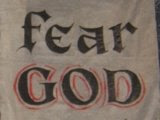 Do you remember the young man desperately seeking wisdom, who found instead "the fear of the LORD" (Prov 2:1-6)? As I told you, our Bible study group got a bit stuck at this point, which sent me on my own quest to discover what the "fear of the LORD" means.
Do you remember the young man desperately seeking wisdom, who found instead "the fear of the LORD" (Prov 2:1-6)? As I told you, our Bible study group got a bit stuck at this point, which sent me on my own quest to discover what the "fear of the LORD" means.I'm going to share what I'm learning about "the fear of the LORD" over 2 or 3 weeks, all going well. Then I'll talk about how "the fear of the LORD" affects me and you.
There's been endless disagreement about what it means to "fear the LORD". Here's some contradictory definitions ("It means this! It certainly doesn’t mean that!"):
1. a general term for the mystical dread we feel in approaching any deity
2. being scared of God
3. reverent awe
4. obeying God
5.trusting God
I can tell you right from the start that I've got problems with no. 1. Whatever else it is, "the fear of the LORD” is not an attitude towards God, any God, but an attitude towards the "LORD". When you open the Bible and see "LORD" in capitols it means "Yahweh", the personal name of the One and Only God.
So "the fear of the LORD” is deeply personal. To "fear the LORD" is to fear the One who made himself known to Moses:

The LORD, the God of your fathers—the God of Abraham, the God of Isaac and the God of Jacob ... This is my name forever ... The LORD, the LORD, the compassionate and gracious God, slow to anger, abounding in love and faithfulness, maintaining love to thousands, and forgiving wickedness, rebellion and sin. Yet he does not leave the guilty unpunished. (Exod 3:13-15, 34:6-7)The God we fear is the LORD, the one true God, who created and sustains the universe, speaks through his word, makes himself known through awesome acts of judgement and salvation, and reveals himself ultimately in Jesus.
“The fear of the LORD” is often used as short-hand for following Yahweh as your God (Jon 1:9, Mal 3:16, Rev 11:18 etc). Jonah's calling-card reads, “I am a Hebrew, and I fear the LORD, the God of heaven, who made the sea and the dry land” (Jon 1:9). Those who don't follow God, on the other hand, have "no fear of God before their eyes" (Rom 3:18 cf Gen 20:10-11, Ex 9:30). To fear God and obey him is the "whole duty of man" (Ecc 12:13).
Those who "fear the LORD" are those who:
- trust and hope in God (Ps 31:19, 115:11, 147:11, Prov 29:25, Jer 26:19),
- obey his commands (Deut 6:2 and see Deut 5:29, 6:24, 10:12-13, 13:4, 17:19, 31:12-13, 1 Sam 12:14, Ps 112:1, 119:63, Ecc 12:13, Is 50:10, Hag 1:12)
- serve him (Deut 10:12-13, Josh 24:14, 1 Sam 12:24)
- walk in his ways (Deut 8:6, Ps 128:1)
- shun evil (Prov 8:13 and see Job 1:1, 2:3, 28:28, Prov 14:16, 16:6)
- stay faithful to God and turn from idols (Deut 6:13-15, Josh 24:14, Jer 32:40)
- know God and his wisdom (Ps 110:10, Prov 1:7, 2:5, 9:10)
- praise and give God glory (Ps 22:23, Rev 14:7, 15:4, 19:5)
- humble themselves before God (Prov 15:33, Jer 44:10)
- love God with all that is in them (Deut 10:12-13)
- don't fear other so-called "gods" (1 Chron 16:25, Ps 96:4, Jer 10:5)

And now, O Israel, what does the LORD your God ask of you but to fear the LORD your God, to walk in all his ways, to love him, to serve the LORD your God with all your heart and with all your soul, and to observe the LORD's commands and decrees that I am giving you today for your own good? (Deut 10:12-13)If you're looking for a living example of someone who "fears the LORD", look no further than Jesus, the promised Messiah who "delights in the fear of the LORD" (Isa 11:2-3). Here was one who served his Father joyfully, with every particle of his being.
So we come to the first part of our definition:
To fear the LORD is to submit to him as the one true God, with trust, love, worship, honour, service and obedience.
But our definition isn't yet complete. Why use the word "fear"? Why not "love" or "serve" or "obey"? We'll look at the scary bits next time, and how they relate to the "fear of the LORD".
3 comments:
I am really glad you are doing this series Jean! It cuts out a whole lot of work for me on my blog - I will just link straight to you!!
Glad I'm of some use to somebody, Cathy! ;D
And while we're at it, do you want to write a series on Proverbs and pride for me? :D
Post a Comment